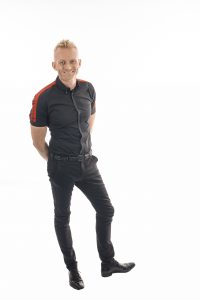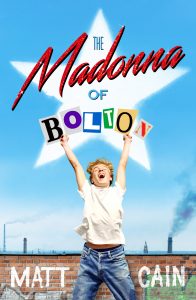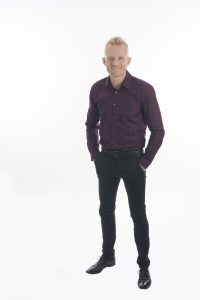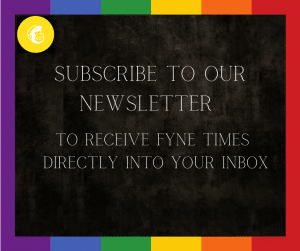In a week that also saw him meet Michelle Visage after watching her as Miss Hedge in the wonderful musical Everybody’s Talking About Jamie, the LGBT History Month patron, journalist, novelist and former editor-in-chief of Attitude takes time to chat with Sam Bennett

© Markus Bidaux / Attitude
Firstly, very importantly, you just met Michelle Visage.
[Laughs] Brilliant, I love your first question! I’m a big fan of Michelle Visage – she’s amazing. I obviously watch her on RuPaul’s Drag Race, and I listen to her What’s The Tee? podcast with RuPaul, and I’ve read her book – The Diva Rules – which is great. And I’m a big fan of Everybody’s Talking About Jamie (the music was written by a friend of mine, Dan Gillespie Sells). I’d obviously seen it already but because she was in it I wanted to see it again. So I went back with some friends and Dan took us backstage to meet her afterwards. She was adorable, very nice, everything that you want from Michelle Visage. I mentioned my latest book and she said she had a copy of it in the dressing room. There’s authenticity for you. As an ally of the LGBT community, if she’s heard about a new gay-themed book and gone out to buy it, that’s impressive to me.
That book is The Madonna of Bolton which was published in 2018 (the year Madonna turned 60). How autobiographical is it?
Things like dates have changed because if you look at anybody’s life, it’s sometimes quite messy; the timeline needs tidying up a bit so you can focus on the few themes you really want to hone in on –you have to do a bit of triage to take out elements that may be very important in a life but distracting in a novel. But all the emotions in there are 100 percent autobiographical, everything in the book I’ve felt, although not every single thing happened to me. The most autobiographical chapters are: the one where the young central character goes to see Madonna in concert for the first time (I went at the age of 12 and it completely changed my life); and his first night out on the gay scene – on Canal Street in Manchester. The first night you go out on the scene (particularly a few years ago when the scene – bars and clubs – was not just the centre of the gay community but all it was really) is often a key moment in the life of a gay man. It certainly was for me – so that scene is very autobiographical.
I never used to get the ‘Madonna as a gay icon’ thing. But then last year I watched Strike a Pose [the documentary about the dancers on her 1990 Blond Ambition tour] and I got it.
So many pop stars now are allies and very gay-friendly, it’s basically default setting. I don’t think if you’re a female pop star in particular you can have a successful career if you’re not pro-gay. But in the 1980s, when the HIV/Aids crisis happened, it was possibly the most difficult period of recent history to be gay. There was this hysteria and backlash against us, and you can only really understand what Madonna meant if you understand her in that context. There were very few openly gay pop stars. Madonna came along and from the start she was talking about her gay friends, her gay brother, the gay dance teacher who changed her life. She was doing Aids benefit concerts, speaking out about safe sex, she had gay characters in her videos. The difference between that and what anybody else was doing was just staggering, and she was an absolute lifeline for so many of us. I can’t tell you the number of gay men who’ve come to me since this book has been published and said she saved their life.
Is it just a rumour that they’re going to make a film of it?
No, it’s not a rumour at all! We’ve sold the film rights to the producers of A Star is Born (with Lady Gaga) in LA. It’s really exciting. Films take a long time, but it’s all moving. Nothing ever goes as fast as I would like, but yeah, it’s happening.
What was it like to grow up gay in Bolton?
It was horrendous. It used to be a standard experience for any gay man growing up in the provinces, that you would have to leave your hometown behind and move to a big city to find people like you, your tribe. That was very much my experience and the experience of most of us in the 1980s – there was even a song about it, ‘Smalltown Boy’ by Bronski Beat. But what’s happened more recently is that lots of us have experienced reconciliations with our hometowns; I certainly have – family and events have pulled me back. What I’ve realised is Bolton was a very hard place to grow up gay in the 1980s, but to be honest pretty much everywhere was. You have to remember that in the 1980s there was no internet or anything, everywhere seemed so far away, you felt quite cut off from the rest of the world, you didn’t really know exactly what was going on in other places the way we do now. I hated my hometown and just wanted to get out – I didn’t really get that everywhere it was shit to be gay. That’s something I’ve realised as I’ve got older, that’s been part of my reconciliation with Bolton.
Editor-in-chief of Attitude… was that both the most stressful and most rewarding job you’ve had?
The most stressful job I had was when I was the arts correspondent on Channel 4 News; working in a daily news room, broadcasting several times a week on national TV, being live, the kind of flack you just get from being visible every day, the pressure and the deadlines. Attitude has definitely been the most rewarding job in the media, I was only there for 18 months, but it was a really exciting time. I did lots of personal journalism and pieces of work that were like activism, and I found it very rewarding. But I would probably say that, of everything I’ve ever done, writing novels has been the most rewarding thing. Particularly this latest novel, it’s drawn together so many strands of things I’ve done throughout my life, and the responses I’ve had from readers since it’s been published have made all the hard work worth it.

I was reading your account on The Guardian today of when you went to Russia. What a terrifying place to be gay.
I had to lie to my mum and dad actually, I didn’t tell them I was going until I got back. The point was to meet people who were LGBT and suffering there. I went to cruising grounds and gay clubs, I even went to a gay sauna, meeting people and just documenting what it was like. It was horrendous, but at the same time the Russian government put out so much propaganda about how things aren’t actually that bad for gay people over there, and it was a rewarding experience to be able to draw attention to a real problem, and in doing so hopefully make a bit of a difference.
You saw a ‘No Faggots Allowed’ sign in a bakery window – it’s vile.
I know. Funnily enough [the job] coincided with getting ready for the book to be published, which is about growing up gay when you didn’t feel safe in this country. It was interesting to walk around and feel unsafe again. It did transport me back to what it had felt like when I was a child. I am an obviously gay person, I don’t have passing privilege, I’m not actually interested in having passing privilege, but that can put you on the front line. When I was in Russia I was working with activists who were also very visibly L, G, B or T, and therefore on the front line. I heard their stories about being attacked on the metro, in the street, coming out of gay clubs even though the gay clubs are all unmarked and do everything they can to hide away. To hear all those stories and then to walk around the streets with them, and to feel unsafe because of the looks we were getting shook me up a bit.
You’ve recently been named a patron of LGBT History Month. Has that initiative always been dear to you, have you always been closely associated with it?
I’ve never had any associations with the organisers before but I’ve always been interested in LGBT history. That interest has only intensified as I’ve been looking back over my own personal LGBT history – the context in which I grew up and the context that grew out of. The gaps in particular have always intrigued me. It’s still easy for some historians to say that Michelangelo, Tchaikovsky or Hans Christian Andersen weren’t gay because there’s so little evidence. But the whole point is if you were gay in those periods you did everything you could to destroy all evidence, so often there’s very little surviving, and you have to slightly fill in the gaps. I’ve always been outraged by the fact people have denied our existence.
I sometimes feel a bit guilty for not engaging enough with the history of the LGBT community of which I am part.
Well the truth is it’s often not been very easy to engage with it. Gay media obviously concentrates on the present, concentrating on history hasn’t always been something we’ve done, particularly when our communal history is usually about persecution and suffering. When you come through those periods, often as a community you want to move on. When we came out of the HIV/Aids crisis of the 80s and early 90s, it was so horrendous for everybody involved, it so defined us in the public’s imaginations and consciousness, that a lot of us just wanted to put it behind us. It’s only recently that people have started to face up to it as a communal trauma that we need to process in some way.
And publishers, broadcasters, TV stations are always looking for the biggest audience possible, and until recently everybody thought that the gay audience was very niche and that mainstream straight audiences weren’t interested in our experiences and would not be able to empathise with them. We’re now realising that isn’t the case because there’s so much more acceptance and tolerance than there used to be. So those stories are starting to be told.
Obviously we’re not rid of persecution; you doubtless would have seen all the hideous treatment of LGBT people in Chechnya of late – do you get angry?
I get really angry about it. And I get angry when I think about foreign aid being given to countries where they persecute gay people. Why am I paying my taxes and they’re giving this aid without condition to countries where they persecute gay men? My money is literally paying to persecute people within my community. I get angry when people talk about the Commonwealth and what it does, and there is very little impetus to use the Commonwealth as a means of advancing LGBT rights in so many countries. 36 countries in the Commonwealth still outlaw gay sex and persecute us – I think it’s outrageous that this isn’t being dealt with. The Chechnya crisis I can’t believe is being allowed to happen. We’ve put up with this kind of thing throughout history because we’re told it’s what we deserve and just been pathetically grateful for any crumbs of acceptance. And I just think: ‘No, zero tolerance actually, zero tolerance to that kind of thing.’
What about the state of British politics? You do a fair bit of retweeting in that area…
It’s blatantly obvious what I think about Brexit. I’m not sure it’s my place to talk about it… But all I will say is I think it’s easy for Brexiteers to see the issue totally removed from any association with gay rights or human rights, because most of them have never really had to think about it. Whereas as LGBT people we know the EU has been a massive driver for improving rights for LGBT people in every country that joins, often when there is no appetite within those countries to adopt better gay rights. I also know that if you look at any micro-community, friendship group of gay people within the UK, they usually have several people who’ve come to live here from countries where it isn’t as easy to be L, G, B or T. Therefore I think we have a greater awareness of all the positive things that the EU has done and a greater fear of allowing extreme right-wingers to get any level of power, because we know what they do to human rights in general and to our community when they aren’t in power. How does that answer your question?

© Markus Bidaux / Attitude
The Madonna of Bolton is available in paperback in May (Unbound publishing).Matt Cain’s Shot Through the Heart and Nothing But Trouble are both published by Pan Macmillan and available through the author’s website.

